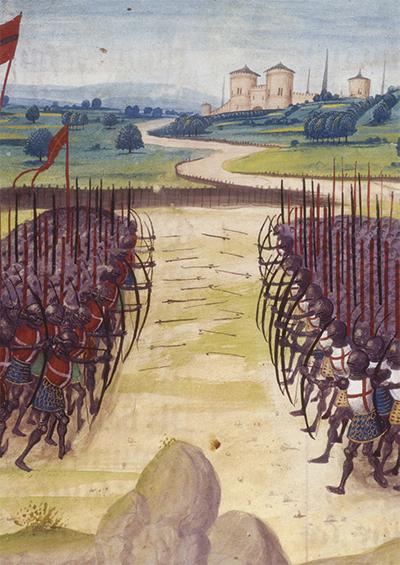The battle of Agincourt, a bloody episode in the hundred years' war
On his succession to the throne in 1413, the King of England Henry V was quick to reassert his predecessors’ claim to the French throne. He assembled around 9,000 soldiers and landed in Normandy on 13 August 1415, where he laid siege to the town of Harfleur.
The town resisted for a month, but surrendered on 22 September after a gruelling siege. The English army was left greatly weakened and Henry decided to return to the port of Calais, thinking he would return safely to England.
Meanwhile on the French side, 12,000 men under the command of Constable Charles d’Albret and Marshall Boucicaut set off in pursuit of the English army and blocked all crossings over the River Somme.
The English managed to cross the river on 19 October, but the men were soaked and hungry and were suffering from dysentery. They were overtaken by the French, who cut them off at Agincourt.
It was there that the two armies faced each other in the evening of 24 October 1415. The English camp was cornered and King Henry had no choice but to fight.
The battle began around 11am the following morning. Sure of their superiority, the 12,000 French soldiers fought over who should be in command. By the time they had finally formed their army, Henry had already taken the initiative. The English archers advanced, drove in their stakes and fired their first arrows.
The French cavalry charged forward, but were decimated under the English archers’ heavy fire and their charge ended in defeat.
A heavy downpour overnight had turned the battlefield to mud, and the soldiers advanced with difficulty. Many were taken prisoner, while others were killed as the arrows rained down. The fighting was intense.
At the end of the day, the French rearguard attempted a final assault but were driven back once again by the English. The battle was over by 5 o’clock, with the loss of more than 5,000 French soldiers, including the elite of the cavalry.
The victorious Henry resumed his march towards Calais and set sail for England with his spoils and his prisoners. He had won the battle and the English, who had only lost 500 men, now ruled Normandy once again.
Agincourt has been synonymous with bravery ever since, as immortalised in Shakespeare’s Henry V:
‘(...) shall ne’er go by, from this day to the ending of the world, But we in it shall be remember’d; We few, we happy few, we band of brothers’.

















